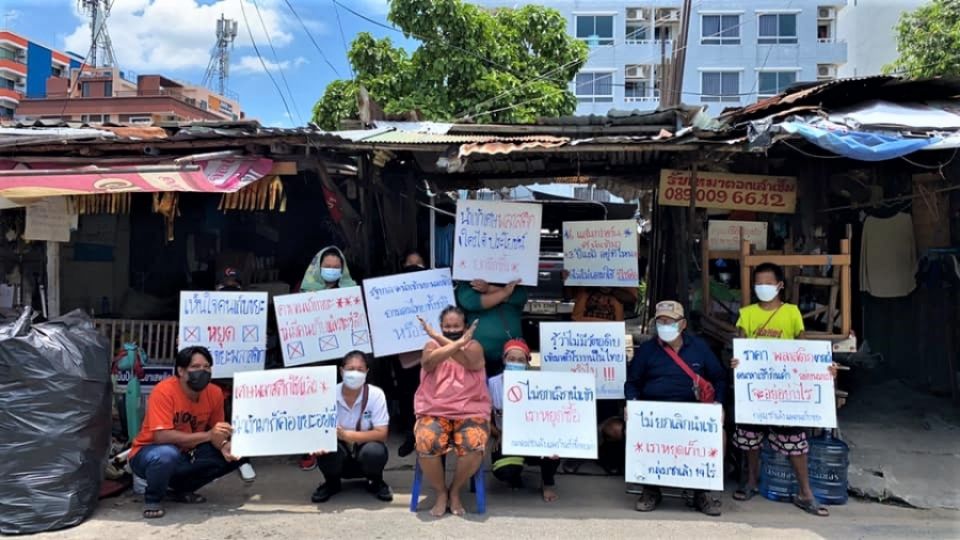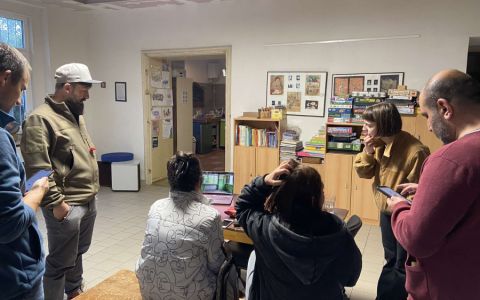Even though Thailand already has enough of its own waste, imports of plastic and electronic waste are a severe problem Thailand has been facing in the last years - mainly after China's ban in 2017. Arnika and EARTH together with other NGOs focus on this burning topic to create the necessary pressure on the governments to impose a similar ban, which would hopefully end such trade with hazardous waste and related dirty recycling industry.
In August, members of the Anti-Plastic Scrap Citizen's Network, led by EARTH and the Saleng and Recycle Trader Association, submitted a letter to the Ministry of Natural Resources and Environment calling for an end of the plastic waste import by the end of this year. Over 108 civil society organizations and 32,000 people signed the petition and supported the ban on imported plastic scrap.
From 2017-2020, the amount of imports exceeded 150,000 tonnes a year, a sudden surge compared to the 75,000 tonnes imported annually from 2012 to 2016. To deal with the alarming surge of plastic scrap imports, the government, in 2018, decided to ban plastic scrap imports by September 30th, 2020, but in reality, no ban was implemented. On January 25th this year, the Ministry of Natural Resources and Environment reportedly decided to extend the deadline of the ban to January 1st, 2026, giving industries five more years of plastic scrap importation. This resulted in the Anti-Plastic Scrap Citizen's Network's initiative demanding the ministry impose a ban by the end of this year.
Penchom Saetang, director of EARTH, campaigning against hazardous waste in the country, said the plan would hamper the state’s efforts to tackle plastic waste in the country. She added it would also jeopardize the local recycling business as imported plastic waste is far cheaper. “We have to oppose this activity not only because it harms our environment and health, but it’s unjust that we would be the one who takes other countries’ trash,” she noted.
No more e-waste
To urge the government to terminate hazardous waste imports and dirty recycling industries as well as to ratify the Basel Convention Ban Amendment - an agreement that prohibits the export of plastic and electronic waste to developing countries - we have made another statement.
According to statistics from EARTH, 400,000 tonnes of electronic appliances and devices are discarded each year in Thailand, which should be enough for the local recycling business. However, the Ministry of Industrial Works reported that imported e-waste increased from almost 2,000 tonnes in 2016 to over 54,000 tonnes in 2017. Following such a huge surge, last year the Ministry of Commerce announced a ban on the import of 428 types of e-waste to help Thailand reduce the amount of e-waste. However, there are still many loopholes remaining and a lack of efficient and safe waste management.
“E-waste contains heavy metals and plastic, which contain toxic components. If waste management is not controlled properly, hazardous components, which contain carcinogens, can be released into the environment,” commented Penchom Saetang, adding that most farmers do not take protective measures, like wearing gloves or other protective clothing.
The ministry's move banned hazardous waste defined by the Basel Convention - an international treaty aimed at controlling the transboundary movement of hazardous waste as well as its disposal. However, other used materials, such as cell phones, batteries, accumulators, laptops, keyboards, and desktop computers are still allowed to be imported into the country. “These used products are electronic waste. Why do we need to import these used products? This is how other countries find ways to dump their waste. We found that from last September to April, 28.85 million kilograms of used electronic waste was imported into Thailand as foreign countries exploited a loophole in Thailand's regulations,” said Akarapon Teebthaisong, research and technical officer for EARTH.
Discarded electronics require an efficient and highly regulated waste management system to handle hazardous components like lead, mercury, and cadmium. Akarapon said improper recycling processes in Thailand have a negative effect on air, soil, and water. “Thailand lacks efficient e-waste management. After electronic products are dumped, they are separated to sell parts. Parts that cannot be sold are burnt, buried, or thrown away. Burning e-waste releases a residue of carcinogens into the environment causing severe air pollution because the air will consist of a mixture of cancer-causing chemicals,” Penchom added.
Environmental NGOs believe Thailand should ban all types of imported e-waste and ratify the Basel Convention, which would close the legal loopholes allowing some e-waste imports. “Members of the government may live far away from polluted areas but toxic substances can spread and stay in the environment for a long time, even to the next generations. Sooner or later, the negative impact on the environment will affect everyone and the government will not be able to avoid the issue,” Penchom said.
Original articles:
EARTH - Government must ban imports of plastic scrap: https://www.earththailand.org/en/article/733
Bangkok Tribune - Recycling workers join the group in protest against the extended plastic waste import: https://bkktribune.com/anti-hazardous-waste-network-calls-for-an-immediate-end-of-plastic-waste-import
Bangkok Post - Waste not, want not: https://www.bangkokpost.com/life/social-and-lifestyle/2158427/waste-not-want-not







